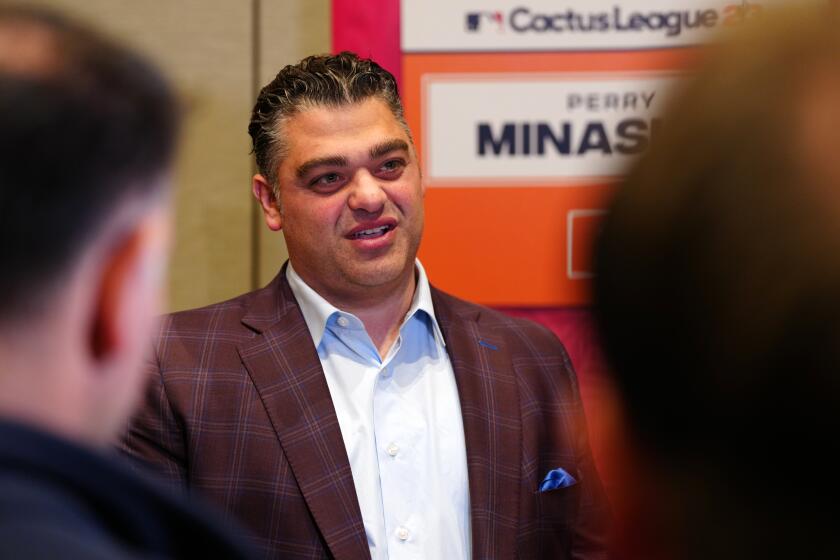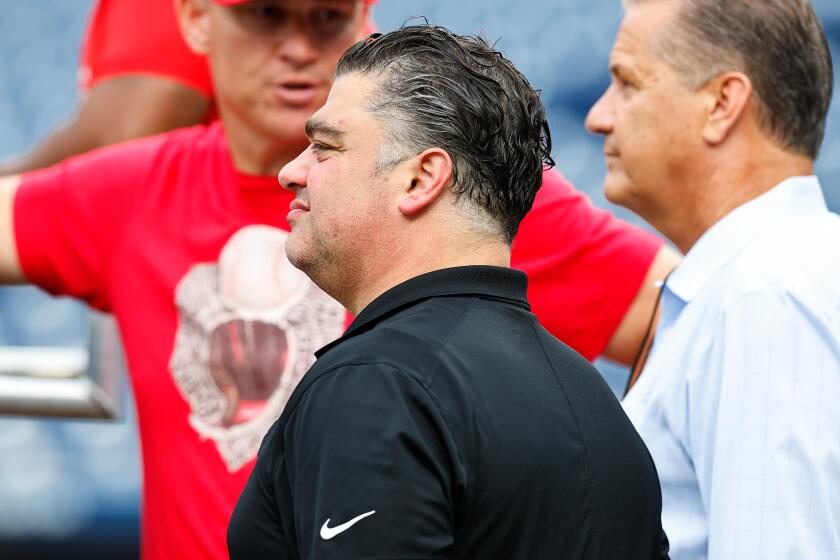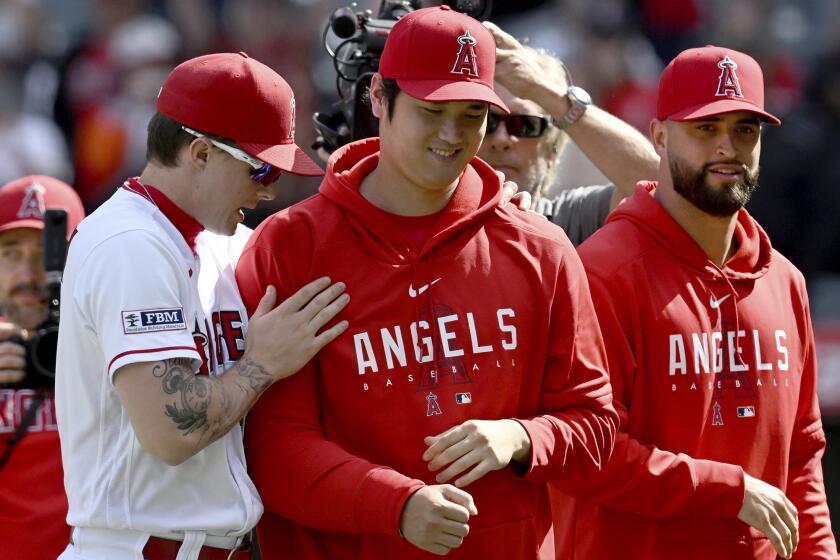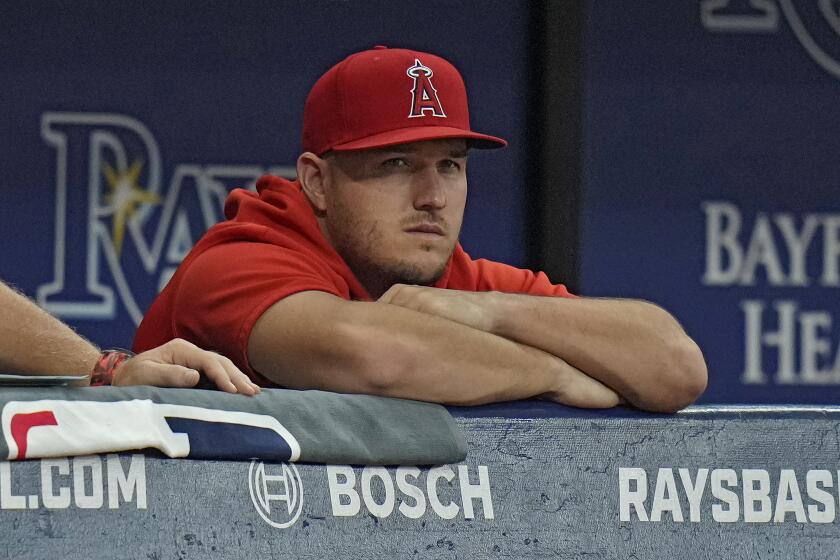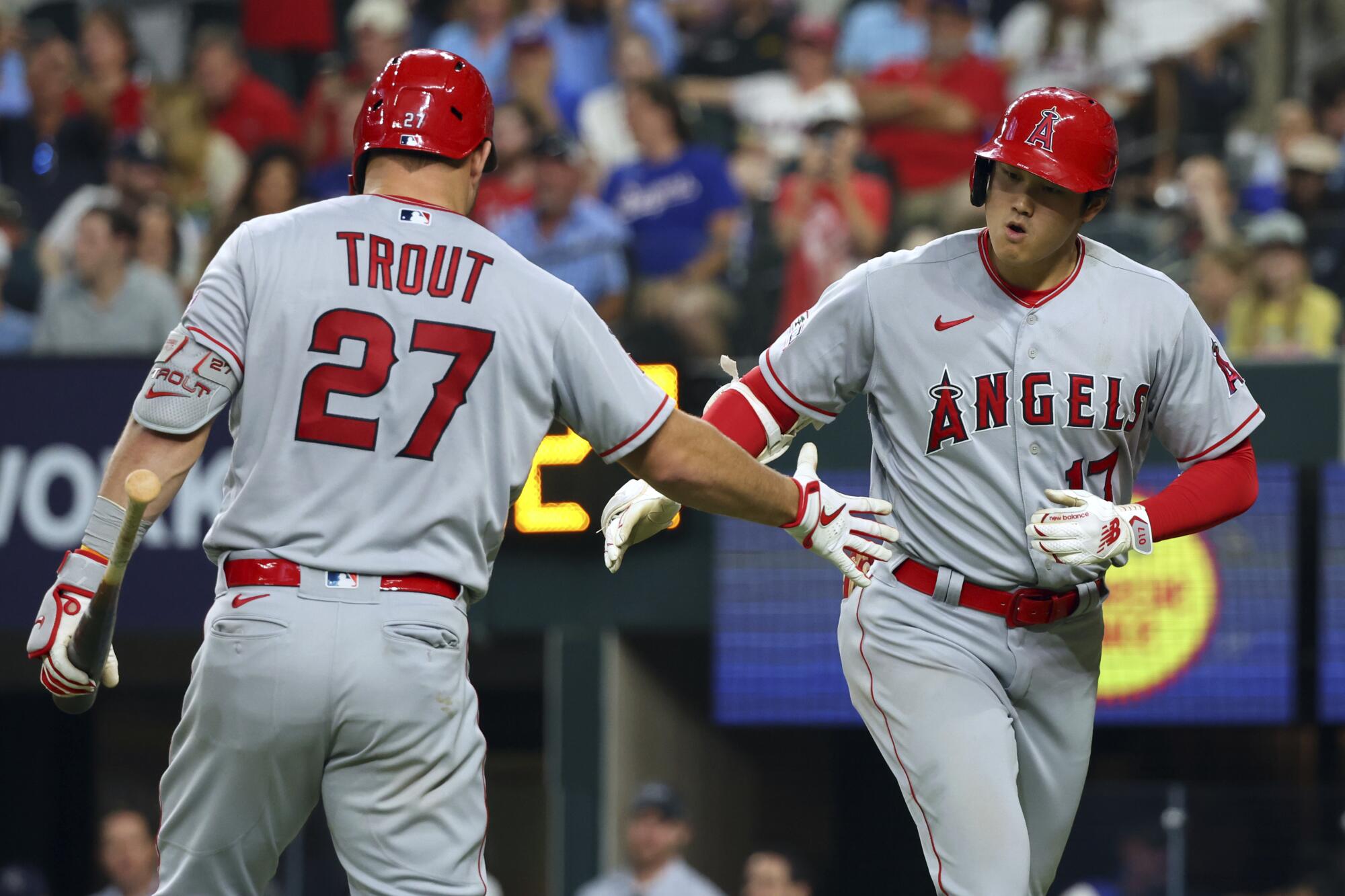
- Share via
It was during the chilly mornings back at the spring training facility in Tempe, Ariz., that the Angels began to wax poetic about all that looked bright and beautiful for their 2023 season.
Shohei Ohtani was coming off a second historic season. Mike Trout was healthy and set in his new body maintenance routine. Pitchers Reid Detmers, Patrick Sandoval and José Suarez were looking to build off their promising 2022. General manager Perry Minasian secured bona fide major league depth, picking up better hitters and veteran relievers.
On paper, the team was much improved. And it was not lost on anyone in the organization that it could be the Angels’ last with Ohtani, who is slated to become a free agent after the World Series ends.
Yet, there were several aspects of the 2023 Angels that needed to go just right for them to play meaningful October baseball. The roster underperformed. The injuries compounded those issues. Trout and Ohtani were already on the injured list well before Sunday’s 7-3 win over the Athletics wrapped up a 73-89 season — the same record as 2022 and the Angels seventh consecutive losing campaign.
The moves the Angels made, up until they put a handful of key players on waivers at the end of August, were in service of a push to the postseason and seemingly to impress Ohtani. But it turned out the margin of error was always slim, and now the Angels face an uncertain offseason.
Shohei Ohtani makes his first appearance at Angel Stadium in days to be honored as the Angels’ 2023 team MVP before a 7-3 loss to the Oakland Athletics.
That push for 2023 began after last year’s World Series, when they added starting pitcher Tyler Anderson, infielder Gio Urshela, outfielder Hunter Renfroe, infielder Brandon Drury, reliever Carlos Estévez, outfielder Brett Phillips and reliever Matt Moore.
Of all of those players, Drury and Estévez had the most successful seasons. Estévez won the closer job, finished his season with 31 saves in 35 opportunities and earned his first All-Star selection. Drury finished his season batting .262 with an .803 on-base-plus-slugging rate.
The Angels banked on Anderson at least being an average pitcher, signing him for $13 million per season (three years). He managed just seven quality starts and finished with a 5.43 earned-run average in 27 games (25 starts).
Phillips was not with the big league team for most of the season, getting sent to triple A in mid May. Renfroe and Moore did not finish the season with the Angels, two of the five players put on waivers in a salary dump and claimed by other teams. Urshela, the most necessary addition as a natural third baseman, saw his season come to an end in June because of a fractured pelvis.
Trying to fill out the Angels roster going into any season is tricky and requires a bit of creativity considering about $75 million worth of salary per year goes to just two players, Anthony Rendon and Trout. This year, $105 million went to Trout, Rendon and Ohtani.
Team ownership has only once gone over the luxury tax threshold, in 2004, in which the Angels were assessed a tax bill of less than $1 million. This year’s first luxury tax threshold is $233 million, which meant trying to fill out a major league roster with less than $130 million if the Angels wanted to stay under it. Instead of picking up one high-prized free agent in the offseason, the Angels tried to address all their needs by spreading their funds.
In the offseason, for example, Anderson was given the most money at $39 million for three seasons. Renfroe won his arbitration case with the Angels to make $11.9 million for the season. Drury commanded the next-highest at $17 million for two years. Urshela lost in arbitration with the Angels and landed an $8.4-million salary for 2023. Estévez signed for $13.5 million for two years. Phillips was signed for $1.2 million for one season.
Angels general manager Perry Minasian says he’s been in baseball too long to make guarantees. The Angels haven’t made the playoffs since 2014.
Though only part of the equation, the Angels drafts of the last three years of Minasian’s tenure could shed some light on the limitations they have with roster construction. The Angels have never outright admitted drafting college players is intentional, stating that they take whoever is next best on the board. Their draft classes have, however, overwhelmingly included college players. This year, 16 of the 19 players they signed were drafted out of college. And drafted college players are typically more mature and closer to major league ready and don’t necessarily add too much to a payroll if called up.
And the Angels of the last three seasons have been known to fast-track their prospects to the big leagues. Rookie shortstop Zach Neto and rookie fireballer reliever Ben Joyce were called up to the big league team this year after being drafted in 2022. Rookie first baseman Nolan Schanuel was drafted this past June.
The call-ups mostly benefited the Angels this year. Schanuel finished this season with a 29-game on-base streak, the third-longest to begin a career in MLB history. Neto was voted on by the Angels players as their Heart & Hustle award recipient this year. Joyce, Neto and Schanuel are viewed as part of the young core of the Angels future, among the few bright spots to remember from 2023.
As for that luxury tax, the Angels did not go closer to this year’s number until the middle of the season, when they became buyers at the deadline, trading for much-needed pitching help with starter Lucas Giolito, relievers Reynaldo Lopez and Dominic Leone, much-needed outfield help with Randal Grichuk and another infielder with C.J. Cron. Prior to the week of the deadline, the Angels had also made trades for Eduardo Escobar and Mike Moustakas, needing to re-up their infield depth.
Some of the moves they were able to make came at somewhat of a bargain. Most of Escobar’s, Moustakas’, Grichuk’s and Cron’s remaining salaries would be paid out by their former teams — Escobar’s by the New York Mets, Moustakas’ primarily by the Cincinnati Reds and Cron and Grichuk’s by the Rockies, per Cot’s Baseball Contracts.
But after an attempted salary dump at the end of August, the Angels probably won’t be able to get back under, in part because of the number of injuries they have suffered.
Angels GM Perry Minasian says the team is over the luxury-tax threshold, which could affect draft-pick compensation if they can’t re-sign Shohei Ohtani.
A total of 35 Angels players landed on the injured list, the most in baseball, with some instances of Angels injuries happening in bulk, and many injured in the most bizarre of ways.
“Do you think this team is cursed?” Phil Nevin was asked on Sept. 7.
“Whatever you believe in, I suppose… There’s things that happened this year that are just out of the norm,” said the Angels manager, who was brought back this season on a one-year deal.
After an early wave of injuries — including young catcher Logan O’Hoppe tearing the labrum in his left shoulder — that eventually were accounted for, the injuries got weirder.
In a game against the Padres on July 4, Trout fractured his left hamate bone and Rendon fouled a pitch so hard off his shin that his tibia fractured (a diagnosis not revealed to members of the media until September).
Shohei Ohtani posts to Instagram that he’s “looking forward to seeing everyone next season,” but will he still be playing with the Angels in 2024?
Among the other unusual injuries: Taylor Ward suffered multiple facial fractures after taking a pitch to the face in Toronto at the end of July; Jo Adell, who was called back up to the majors to fill out the outfield with Trout down, strained his oblique days after coming up. Rookie pitcher Chase Silseth, who had begun to emerge as the Angels’ best starter, was hit in the back of the head by a cross-field throw during a game at Citi Field.
In September, utility player Luis Rengifo, who was on a 14-game hitting streak, ruptured his biceps tendon while warming up in the on-deck circle. Sandoval, one of two starters in the rotation that had not been on the IL this season, ended up on the IL after what was supposed to be his penultimate start.
“It’s really just a freak accident type stuff and we’ve had a couple of them on this team,” Adell said in reflection. “I jumped over a wall and caught a home run at Dodger Stadium [on July 7] and that might have had something to do with [my oblique strain]. You’re not gonna have those plays all the time.”
Shohei Ohtani has ended another disappointing season with the Angels after being placed on IL, however, his time with the team has elevated him.
Ohtani, who had been impeded by a cracked fingernail, finger blister, finger sensitivity, body cramps and a finger cramp, was officially shut down from pitching on Aug. 23 after he tore his UCL for a second time in his career, but continued to serve as the team’s designated hitter until he injured his oblique during batting practice on Sept. 4. He eventually landed on the IL on Sept. 16, and Rendon and Trout finished their seasons on the IL as well.
Over the last three seasons in particular, Ohtani has pretty much run his own show.
At spring training, and through the regular season, he, for the most part, did his workouts and preparation on his own. While he did take batting practice on the field with other teammates during spring training, during the regular season, he joined the on-field group just four times.
The Angels rotation was a swing six-man group, specifically because of Ohtani’s pitching schedule. Pitching about every sixth day with a minimum five days worth of rest in between worked in 2022, when he leveled up his pitching, so it was the routine he carried through 2023.
When the trade deadline came around and Ohtani’s name floated about in trade scenarios and rumors, the Angels ultimately decided to stay in the Ohtani business. Despite their best efforts, the Angels instead had another losing season.
It’s noble Mike Trout wants to stay with the Angels. But if he won’t raise the possibility of waiving the no-trade provision in his contract, the Angels have to.
Overall, Ohtani has been allowed to operate within his own comfort zone and his agent Nez Balelo has attested to how much Ohtani has gotten comfortable playing in Anaheim.
But Ohtani wants to be a winner. It’s always been his priority. He said so at the end of the 2021 season.
In hoping everything would go right, the Angels will now face an offseason in which they will hope they did enough to convince Ohtani to return.
And they will either be known as the team that lost Ohtani for mostly nothing, or set a salary record to bring back one of the greatest players in baseball history.
More to Read
Go beyond the scoreboard
Get the latest on L.A.'s teams in the daily Sports Report newsletter.
You may occasionally receive promotional content from the Los Angeles Times.


